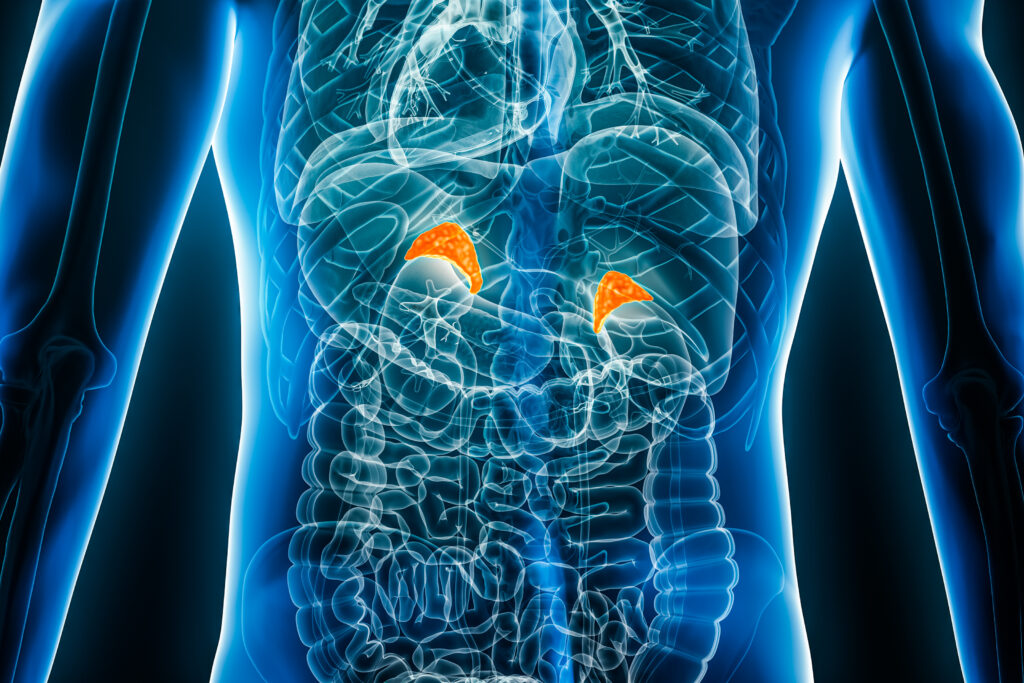The adrenal glands are vital for managing stress, supporting immune function, and regulating key processes like sleep and blood pressure. But in today’s fast-paced world—where constant hustle is the norm—chronic stress has led to widespread adrenal dysfunction. As a result, adrenal support supplements have gained in popularity.
That said, while supplements can be beneficial, lifestyle and stress management strategies are the foundation of adrenal support, with supplements serving as a complementary tool. Naturopathic doctors emphasize a cautious approach, as supplementation should be tailored to individual needs. Consulting a licensed ND ensures both safety and effectiveness of treatment plans.
In this article, we’ll explore key herbs and nutraceuticals that can help support adrenal health.
Understanding The Adrenal Glands: Overview
The adrenal glands are small, triangular glands that sit atop your kidneys, playing a vital role in hormone production. As part of the endocrine system, they regulate metabolism, immune function, blood pressure, stress response, and even sexual development.

Each adrenal gland has two parts: the cortex, which produces hormones related to stress, metabolism, and electrolyte balance, and the medulla, which releases hormones that help your body respond to stress. These glands work tirelessly, producing essential hormones—including cortisol, the body’s primary “stress hormone.” Cortisol plays a crucial role in regulating electrolyte balance, fluid retention, body weight, sleep, concentration, blood sugar levels, and even libido.
Because the adrenal glands influence so many bodily functions, imbalances—often referred to as “adrenal fatigue”—can have widespread effects, impacting energy, mood, metabolism, sleep, and overall well-being. Severe adrenal imbalances can be caused by life threatening diseases like Addison’s disease, Cushing syndrome and adrenal tumors. Working with your healthcare team to identify the root cause should always be step number one.
Top Adrenal Support Supplements
Rhodiola Rosea
Rhodiola rosea, commonly known as Rhodiola, is a hardy perennial native to the mountainous regions of Europe and Asia. It has a long history in traditional medicine as a natural remedy for stress, fatigue, and overall resilience. As an adaptogen, Rhodiola is believed to help the body better manage stress by modulating cortisol levels and supporting adrenal function.
Research suggests that rhodiola may help reduce anxiety, improve mental clarity, and support hormonal balance. Studies indicate that rhodiola supplementation may help alleviate stress and regulate mood in individuals with burnout (or adrenal fatigue). Another study from 2009 found that Rhodiola may reduce cortisol response and fight stress-related fatigue and may inhibit histamine formation, which could further regulate cortisol production.
While Rhodiola offers promising benefits for stress resilience and cognitive function, it can be stimulating and may not be suitable for individuals with bipolar disorder or manic tendencies.
Licorice Root
Licorice root (Glycyrrhiza glabra) has been used for centuries in traditional medicine to support adrenal function, digestion, and stress resilience. Rich in glycyrrhizin, it helps regulate cortisol, balance blood sugar, and promote hormonal equilibrium.
Known for its naturally sweet taste, licorice is also valued for its anti-inflammatory and soothing properties, making it a common remedy for digestive issues and respiratory health. However, due to its effects on platelets, cortisol and blood pressure, licorice should be used with caution, especially by those with hypertension or taking blood thinners.
Ashwagandha
Ashwagandha (Withania somnifera) is an adaptogenic herb traditionally used to support stress resilience, adrenal health, and overall well-being. Adaptogens are natural substances that help the body adapt to stress by acting as mild stressors, priming cells to respond effectively and aiding in adrenal recovery. Research suggests ashwagandha may help lower cortisol, reduce anxiety, and improve sleep. It has also been confirmed as an adaptogenic herb helping to increase resilience to stress.
Beyond stress management, ashwagandha has been studied for its anti-inflammatory effects and ability to regulate histamine levels, supporting both immune function and sleep quality.
However, due to its calming properties, ashwaganda may reduce mental alertness and should be used with caution when focus is needed.
Vitamin C
Vitamin C is a powerful antioxidant known for immune support and recovery from illness. It also plays a key role in managing stress by balancing cortisol production and adrenal health.
Research suggests it may help lower cortisol, reduce inflammation, and block histamine formation, supporting stress resilience and immune balance. A daily dose of 500 mg to 2 g, adjusted to bowel tolerance, is recommended. Natural sources include rose hips, cherries, magnesium ascorbate, and Rosella (hibiscus) powder.
Magnesium
Magnesium is essential for relaxation, sleep, stress relief, and adrenal health. Deficiency is common and may increase stress, anxiety, and adrenal dysfunction. It helps balance cortisol, lower histamine, and reduce inflammation.
Natural sources include leafy greens, avocado, nuts, nettle or oatstraw infusions, seaweed, and Epsom salt baths. A bedtime magnesium supplement can support stress management. Magnesium glycinate is highly absorbable, but consult your ND for the best type and dosage.
B-Vitamins
B-Vitamins play a vital role in supporting whole health. Listed below are the most used in combating adrenal fatigue.
- B12 – Deficiency may stress the nervous system and the adrenal glands, impacting energy levels. Essential for red blood cell formation and nervous system function.
- B5 (Pantothenic Acid) – Crucial for adrenal hormone production and stress response. Helps regulate cortisol and is often low in those with adrenal fatigue.
- B6 (Pyridoxine) – Supports neurotransmitters like GABA and serotonin, aiding mood balance, anxiety, and pain regulation. Also downregulates glucocorticoid receptors, reducing cortisol’s impact.
- B1 (Thiamine) – Helps the brain utilize glucose for energy, supporting cognitive function and nervous system health.
- B6, B9 (Folate), B12 – Essential for methylation, neurotransmitter synthesis, and mental health, playing a role in anxiety and depression.
B vitamins work best together and therefore a B-complex is recommended over a single B vitamin supplement. If you’re cutting back on meat, a high-quality B-complex supplement can help maintain adrenal function and energy levels.
Supporting your adrenals with the right nutrients can boost energy, balance mood, and improve stress resilience. However, lifestyle and stress management are just as vital for recovery. For personalized support, consult your ND for tailored recommendations!







